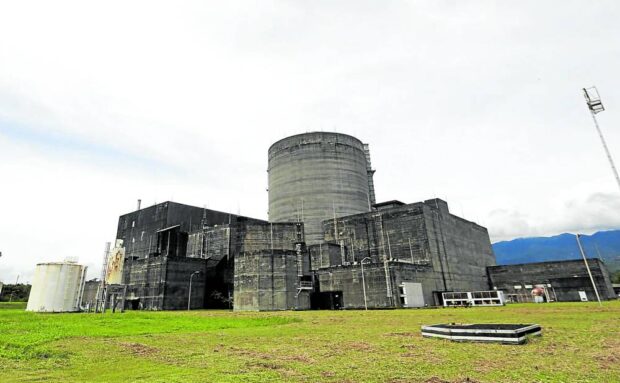
The mothballed Bataan Nuclear Power Plant —LYN RILLON
The Supreme Court has reduced from P1 billion to P100 million the amount of temperate damages that a crony of the late dictator Ferdinand Marcos Sr. must pay for brokering the 1974 deal behind the now mothballed $2.3-billion Bataan Nuclear Power Plant (BNPP).
In a 12-page resolution dated Aug. 29, 2023, but published only on Tuesday, the Supreme Court en banc denied with finality the government’s motion for reconsideration on the 2021 decision that directed the estate of the late Herminio Disini to pay damages for illegally profiting from the BNPP project awarded to Westinghouse Electric Corp.
In 2021, the high court unanimously partially granted the petition of Disini that challenged the Sandiganbayan’s 2012 decision ordering him to return to the state almost $50.6 million, or P2.4 billion, in commissions that he earned for facilitating the anomalous contract.
However, the high tribunal at the time said Disini, who died in 2014, should only pay P1 billion in temperate damages and P1 million in exemplary damages.
According to the Supreme Court, the Sandiganbayan erred when it relied on a photocopied document supposedly showing that Disini received $50 million in commissions.
No objection
In its motion for reconsideration, the state insisted that the Sandiganbayan’s reliance on the document was proper “because even though the original document was not presented, its admission was not objected to by petitioner who was a party in default.”
While Disini did not object to the admission of the said document, the Supreme Court reiterated its position that the Sandiganbayan “still cannot validly admit incompetent evidence.”
“Since the total figure derived from the exhibit was not supported by any competent evidence, the Court cannot base the amount on such figure as prayed for by the Republic,” the high court said in its latest resolution.
In its comment, the petitioner, represented by Herminio Angel Disini Jr., asserted that the court should not have given weight to the incompetent evidence presented and since there was no “absolute evidence” on the involvement of the late dictator and his wife, Imelda Marcos, “then the logical consequence is that Disini should likewise be declared innocent.”
Amount revisited
The Supreme Court said that the contentions of the petitioner had already been discussed in the 2021 decision, thus, it found no compelling reason to go over the same arguments. However, the tribunal said it found it imperative to revisit its pronouncement on the amount of damages imposed when it held that Disini acquired ill-gotten wealth through commissions from Westinghouse Electric Corp. and Bums & Roe Inc. by acting as their special sales representative.
“In the assailed decision, we noted that the Republic’s witnesses did not specifically quantify the amount of commissions received by petitioner aside from the fact that it was substantial. In short, the amount obtained by petitioner was uncertain,” the high court said.
“Upon another closer examination, we find that the award of temperate damages in the amount of P100 million is more commensurate under the circumstances,” it added.
Temperate damages, or moderate damages, are applied in cases where the court finds that some pecuniary or financial loss has been suffered but the amount cannot, from the nature of the case, be established with certainty.
The Supreme Court recalled that it considered the current condition of the mothballed BNPP in evaluating the amount of damages to be paid.
‘Illicit use of influence’
It earlier pointed out that the BNPP remained inoperable, adding that a considerable amount of public funds—which came from the “blood, sweat and tears of Filipino taxpayers”—were invested and allocated for its construction.
“The ill-gotten wealth should have been used and spent for and by the rightful owner thereof and not just by one person or a select group of people in power,” it said.
In revisiting its decision, however, the Supreme Court said Disini’s liability had “nothing to do” with the current state of the nuclear power plant.
“His liability lies in his illicit use of influence, power, and government connections to secure special concessions in relation to the BNPP project. Such illicit use is clearly independent of the status or condition of the BNPP today, which is predominantly a product of legislative and/or executive discretion,” it said.
More reasonable
The tribunal said the amount of P100 million was “more reasonable under the circumstances,” citing the case of Republic vs Tuvera, wherein the court awarded temperate damages equivalent to about 2 percent of the total amount claimed by the state.
In this case, the original award of P1 billion represented about 35 percent of the amount being claimed by the Republic, the court noted.
“Clearly, such amount is excessive and out of proportion, and must therefore be reduced. Given the circumstances, the amount of PHP 100 million, or about 3.5 percent of the total money being claimed by the Republic, is more appropriate,” it said.
On the Marcoses
The Supreme Court also emphasized that there was no evidence on record that linked Marcos Sr. and the former first lady to the commissions that Disini received in relation to the BNPP project.
It cited the earlier Sandiganbayan decision which stated that “considering that there is no preponderant evidence that defendant Marcoses received any part of these commissions, the court cannot pronounce liability on their part.”
READ: BNPP fund eyed to keep power in 1.3 million rural households
“Upon a careful reexamination of the records, the Court sustains such finding and affirms that the Marcoses were not, in any way, shown to have acted illicitly in the award of the BNPP contracts to Westinghouse Electric Corporation and Burns & Roe Inc. by reason of petitioner’s acts,” the high court said.
“The evidence on record only pointed to petitioner receiving ill-gotten wealth. Hence, only petitioner may be held liable to pay damages in this case,” it added.